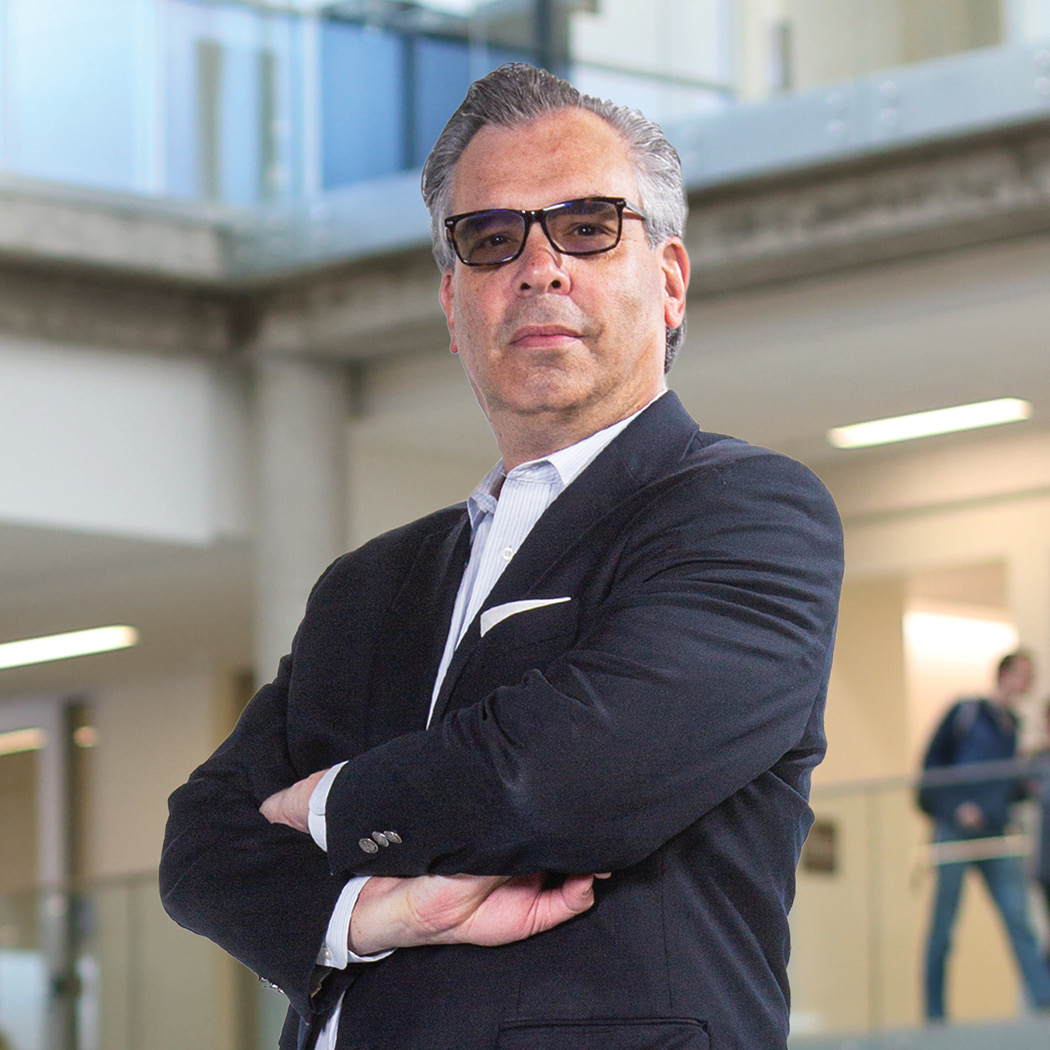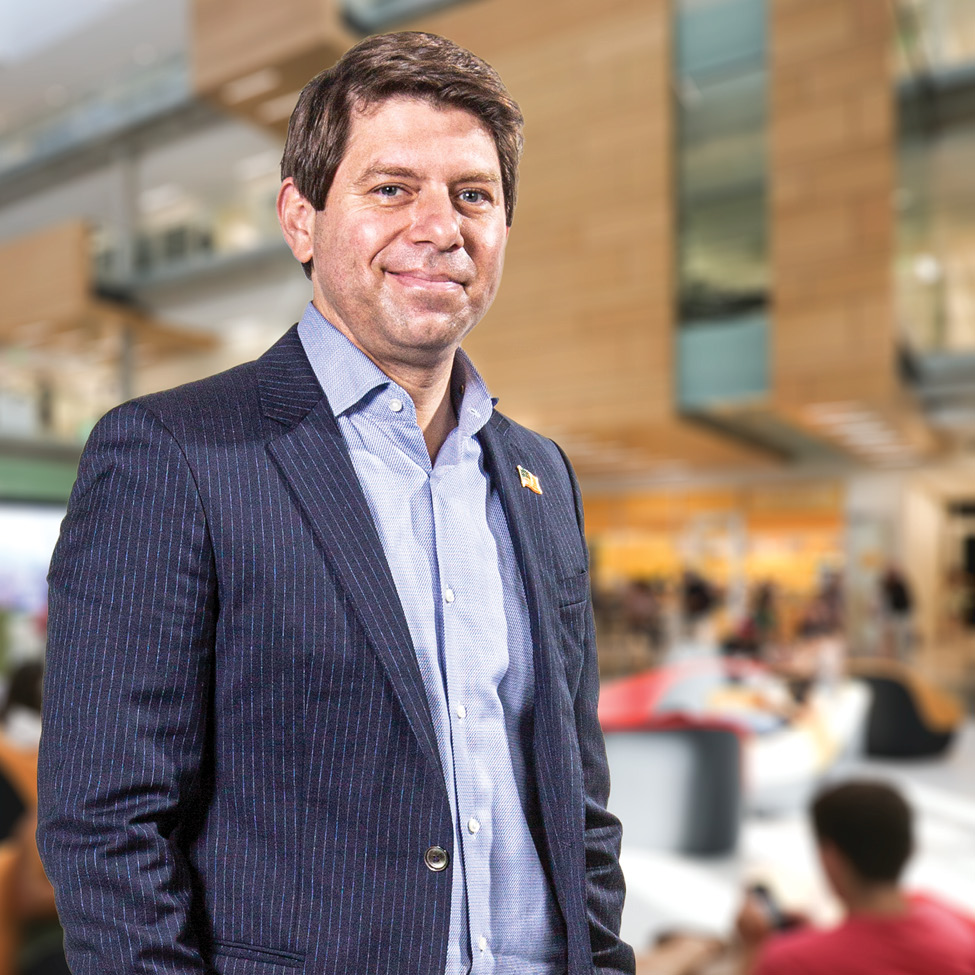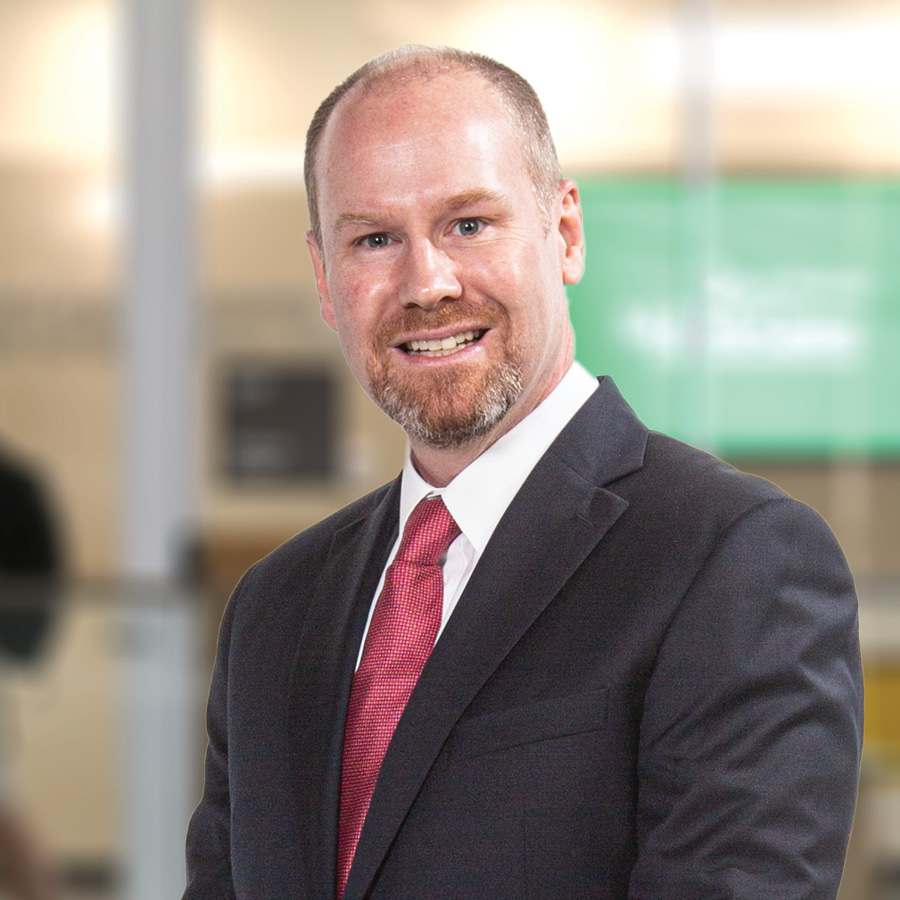From the Ground Up
Baylor's nationally recognized Department of Entrepreneurship and Corporate Innovation prepares tomorrow's business leaders
More than four decades ago, Baylor became one of the nation’s first universities to establish an entrepreneurship center. It quickly became the focal point for entrepreneurial development at Baylor, building new curriculum, conducting research and acquiring additional resources.
Today, the Baylor Department of Entrepreneurship and Corporate Innovation within the Hankamer School of Business is dedicated to the study, teaching and practice of new venture creation and growth. U.S. News & World Report ranked Baylor’s undergraduate entrepreneurship program as the nation’s eighth-best last fall, ahead of the University of North Carolina at Chapel Hill and the University of Southern California.
Peter G. Klein, Ph.D., is the W.W. Caruth Endowed Chair of Entrepreneurship and Corporate Innovation and a senior research fellow in Baylor’s John F. Baugh Center for Entrepreneurship and Free Enterprise. Klein says the University was, in some respects, ahead of the curve in terms of entrepreneurship as an academic endeavor.
“We were one of the first universities to offer a specialized set of entrepreneurship courses and activities,” Klein says. “Entrepreneurship is not like English or accounting — standard majors that every university has offered for a long time.”
Many elements of Baylor’s entrepreneurship program started well before the University had a specific entrepreneurship department. What is now the John F. Baugh Center for Entrepreneurship and Free Enterprise was founded in 1977 and quickly became the focal point for entrepreneurial development at Baylor. In 2013, the Baugh Center’s role expanded to include a focus on conducting and disseminating free enterprise research with the objective of becoming a national leader on issues at the intersection of entrepreneurship and public policy.
Baylor’s entrepreneurship curriculum was part of the Hankamer School of Business management department prior to the early 2010s, when the entrepreneurship and corporate innovation department was created. The degree program is considered one of the nation’s elite, along with Babson College; Massachusetts Institute of Technology; the University of California, Berkeley; Indiana University Bloomington; the University of Pennsylvania; the University of Michigan; and the University of Texas at Austin — all of which join Baylor in the U.S. News & World Report top 10.
“Part of what allows Baylor to compete with these ‘big boys’ is that entrepreneurship has been a signature program of the university for quite some time,” Klein says. “It’s our reputation, our history, our legacy.”
All Three Legs of the Stool
Many universities do not have a specialized entrepreneurship major — let alone a minor, graduate program and doctoral program, all of which Baylor has. This, too, makes Baylor’s entrepreneurship department attractive to perspective students.
It also makes the program attractive to highly qualified faculty and researchers. Klein is an adjunct professor at the Norwegian School of Economics and the Carl Menger Research Fellow at the Mises Institute in Auburn, Alabama. He came to Baylor in 2015 from the University of Missouri, a Tier 1/R1 institution, where he was a senior faculty member and tenured professor.
“I was already doing research and teaching in the entrepreneurship area but at a university that didn’t have entrepreneurship as an emphasis,” Klein says. “What I saw at Baylor was a high-quality cluster of specialized entrepreneurship researchers and teachers.”
“A lot of our students are interested in entrepreneurship as a means to effectuate change in the world. It fuses together with their love of business, but not to simply take profits from what they’re doing.”
Klein arrived as Baylor was about to launch its entrepreneurship doctoral program, one of only about 20 such programs worldwide. It is a research-based degree that is personalized to reflect the intellectual interests of the students while capitalizing on the strengths of the University’s entrepreneurship faculty.
“This was a chance to do something new and creative, to join a program that is moving up,” Klein says. “There is an interest in entrepreneurship worldwide, and we are training the entrepreneurship professors of tomorrow. Baylor Entrepreneurship is a hot topic. The University has invested and will invest in this program, and it has a bright future.”
Klein says Baylor offers what is known as “all three legs of the stool” in academic circles: strong undergraduate teaching, Ph.D. education and research and outreach to the community and practitioner.
“There are other programs that are strong in one or two of those, but there are very few that are strong in all three,” he says.
Klein says he also was attracted to Baylor due to the University’s Christian mission. Shaun Limbers, associate director of the Baugh Center, says this draws many of the entrepreneurship program’s undergraduate students
as well.
“A lot of our students are interested in entrepreneurship as a means to effectuate change in the world. It fuses together with their love of business, but not to simply take profits from what they’re doing,” Limbers says. “They have a desire to reinvest in their communities. It’s economic transformation. That’s something you see in Baylor students that maybe isn’t as much the norm in other programs.”
Determining Factor
Some Baylor entrepreneurship majors enter the business world before beginning college. Such was the case for Brooklyn and Bailey McKnight, identical twins who were social media influencers, musicians and entrepreneurs well before finishing high school. Baylor’s entrepreneurship program was a determining factor in their college choice.
“Not many schools have a specific entrepreneurship program — nonetheless with the hands-on instruction and freedom Baylor gives students,” Brooklyn McKnight says. “That was important because we did have a career, and we wanted to be able to plug that into what we studied.”
Brooklyn and Bailey, as they are well-known publicly, realized the value of their choice in their first entrepreneurship class, which was taught by David Scheaf, Ph.D., assistant professor of entrepreneurship.
“Dr. Scheaf was incredible,” Bailey McKnight says. “There was something special about the way he taught that class and the way he implemented the programming of entrepreneurship. When I went to meetings for our business, I heard the language and terminology we heard in that class.”
In many ways, it is Baylor’s faculty that make the entrepreneurship program strong. Several professors bring their own entrepreneurial experience into the classroom.
“That provides a deeper connection that you don’t typically find in other programs,” Bailey McKnight says. “These are really successful people who have experience in the industry. Because of this, they know the details to share with students.”
Networking opportunities abound for entrepreneurship majors — through professors, fellow students and outside business leaders. Brooklyn and Bailey expect these connections to benefit their business long term. Additionally, they value their Baylor education for more than the entrepreneurship program.
“Baylor has also encouraged our faith, which is something that will last a long time in life with the degree,” Brooklyn McKnight says. “That’s a unique aspect of Baylor.”
Opportunity Abounds
While the McKnight sisters were thriving businesswomen as teenagers, majoring in entrepreneurship was not a foregone conclusion. Brooklyn McKnight considered a career in child psychology, but she decided to pursue a degree that would further develop the path she and her sister were already traveling.
“Entrepreneurship is one of the most useful degrees you can pursue, even if you choose another career,” she says. “If you’re looking to be a dentist, entrepreneurship gives you the business mindset to start your own practice instead of working for someone else.”
Limbers says many students in other majors are unaware that they are budding entrepreneurs.
“Psychology students will be psychologists by trade, but they may own their practice,” he says. “They’re in charge of growing the business from start to finish. Our major and our minor complement other degrees.”
This is reflected in the academic path of Alex Green, a senior from San Antonio, who began at Baylor as a computer science major. He will graduate in May with degrees in finance, management information systems (MIS) and entrepreneurship.
“I’ve always loved technology and wanted to bridge that with business, but I didn’t know how to do that,” Green says. “Computer science taught me how to think, how to break down complex problems into small pieces. I wanted to take that and use it in a business environment, which is why I transitioned to the business school as an MIS and finance major.”
Green, who is the son of a small business owner, later added entrepreneurship as a third major. He was introduced to entrepreneurship through the Baylor Angel Network, which provides early stage capital to strong entrepreneurship teams with developed products or services and early customer traction.
“Entrepreneurship gave me an opportunity to apply what I was learning in finance and technology. That’s why I added the degree,” he says. “The entrepreneurship classes have become some of my favorite classes at Baylor. It was more than reading and reciting a textbook; it was about looking at successful businesses and learning how we can replicate that in real life.”
Green says he has interacted with and learned from countless entrepreneurs, largely through the Baylor Angel Network, which consists of outside investors with Baylor ties. A select group of Baylor students are trained to be analysts or consultants for the entrepreneurs.
“I’ve learned what it’s like to raise capital and seen some of the pitfalls of that process,” Green says. “That’s not something you get from a typical school, and it’s why I think Baylor’s entrepreneurship department is a gem. Students get hands-on experience, which sometimes is difficult to do while getting academic credit.”
Career opportunities abound for Green, who already has a handful of job offers. He plans to start in a consulting role — in the purview of deals, advising companies about acquisitions — and specialize in the technology industry. He is also considering obtaining a J.D.-M.B.A. as deal-setting is one of his prime interests.
Green chose Baylor over Pepperdine University and the University of Virginia. He visited all three schools but says Baylor was the only one to ask, “How can we serve you? How can we set you up for success?” That was the differentiator.
“I feel that with the degrees I’m now pursuing,” Green says. “My professors have really poured into me professionally and personally. I’ve learned more from my professors than from textbooks, especially in entrepreneurship. I wouldn’t know where to launch my career or any idea of my heading if not for my time at Baylor and my entrepreneurship professors.”
Ready to Launch
Entrepreneurial outreach activities like the Baylor Angel Network are available to all Baylor students. Others include Lab-to-Market, the student new venture competition and Oso Launch, which is designed to support freshman student-entrepreneurs and ascent entrepreneurs as they explore, start or grow their successful ventures.
Oso Launch students are a part of the Business and Innovation Living-Learning Center (LLC) during their freshman year. The program continues to support student entrepreneurs throughout the remainder of their time at Baylor as each year of the program features challenges and learning opportunities along with the chance to earn incentives that will spur success.
Haidyn Chudy, a sophomore entrepreneurship and marketing major from Lexington, Kentucky, is an Oso Launch participant who began operating a private business before arriving at Baylor. She also works in the entrepreneurship program and helps with event planning.
“It’s been great getting to know all the professors and see a lot of other entrepreneurs’ ideas and innovations,” Chudy says.
Chudy learned of Southern Belle Glitz, a beauty pageant jewelry boutique, through pageant competitions in high school. She began working for the company and learned the trade. Prior to her senior year at Lexington Christian Academy, Chudy seized an opportunity to purchase the company. She hopes to gain corporate experience in New York after completing her Baylor degree and plans to eventually open a Southern Belle Glitz storefront and complementary clothing boutique. Chudy credits Oso Launch for her professional growth.
“I now look at this as a profession rather than something I’m passionate about on the creative side."
“The biggest benefit for me is that they give us milestones,” she says. “Before Baylor, I knew how to operate the business, run events and handle day-to-day operations. But I had never written an executive summary and really looked at the financials. I now look at this as a profession rather than something I’m passionate about on the creative side. It’s been nice to have a structured path.”
Limbers estimates about 10 percent of Baylor Entrepreneurship students start businesses prior to completing their degree, but he says that percentage is higher at Baylor than other universities because of the entrepreneurship department. Roughly 45 percent to 50 percent of Baylor Entrepreneurship graduates own businesses by 10 years out of college.
“We have students who start at the Goldman Sachs and the Jefferies of the world, but the majority of our graduates start in smaller businesses,” Limbers says. “They’re able to thrive in that environment because they were able to cultivate and hone necessary skills here at Baylor. When it’s time to start a business, they’re equipped for it because of the entrepreneurship degree.”
Klein credits Baylor’s exemplary faculty for making the entrepreneurship program strong and says Limbers is a prime example. Prior to joining Baylor in 2019, Limbers was a CEO of several companies. He continues to work part time as an angel investor for a New York City firm.
“Not many departments are able to put people like that in front of students,” Klein says. “Additionally, Shaun is deeply committed to Baylor’s faith mission. Any entrepreneurship program talks about passion and values, but it means a little bit more and something more specific here.”
Each semester, Baylor Entrepreneurship professors partner with Waco businesses. Students learn from established entrepreneurs in the local community, and students have the opportunity to advise those businesses.
“We bring flesh-and-blood into the classroom to work with the students and talk about their experience,” Klein says.
Taking the Next Step
Baylor Lab-to-Market Collaborative earns federal grant to bridge gap between research and development
Baylor’s initiative to reach Tier 1/R1 status through Illuminate opens windows of opportunity to leverage the University’s reputation and expertise in entrepreneurial theory, research and practice, and have a larger impact on the local and regional community.
One such way is through the Lab-to-Market Collaborative (L2M), an innovative technology commercialization initiative within the Office of the Vice Provost for Research that translates research into products and services that have real-world impact. L2M is a unity of effort between Baylor, Blueprints Lab and Waco Ventures to establish a perpetual pipeline of ideas, inventions and technologies, and to effectively move them from the laboratory to the marketplace with speed and agility.
“We’re not going to be Silicon Valley, but we could be a technology hub in Central Texas,” Klein says. “And Baylor Entrepreneurship and Corporate Innovation would be right at the heart of that.”
Bradley Norris, senior lecturer in entrepreneurship and corporate innovation, is L2M operational lead in the Hankamer School of Business. Norris recently received a $1.5 million grant from the U.S. Department of Commerce to support L2M. The grant funds a prototyping function that moves technologies into the marketplace and funds the necessary labor force to analyze which technologies are worthy of such investment. Waco and McLennan County community leaders, the Waco Industrial Foundation and the Waco Chamber of Commerce lent letters of support for the grant.
“Universities produce great knowledge, and investors are good at developing what’s already in the market. There is a huge gap between the two, and this grant bridges that gap,” Norris says. “Baylor is starting to produce interesting technologies that have unfortunately sat on the shelf in the past. This grant is an opportunity to solve that problem.”
Norris’ technology entrepreneurship class is plugged into this process. He also has a group of interns that will grow thanks to the grant.
“Universities produce great knowledge, and investors are good at developing what’s already in the market. There is a huge gap between the two.”
Baylor filed for 22 technology patents from 2014 to 2016 with 10 patents being issued. Since 2017, the University has filed for more than 130 technology patents with 32 being issued. L2M converts Baylor’s technology assets into Tier 1/R1 funding and other University value streams. These include revenue from royalties; milestone fees and exit fees; alignment around translational activities within the University; experiential learning opportunities for students; business startup opportunities for students, promoting alumni retention in Waco; and the attraction of investors and high-tech startups/businesses to the Waco community.
Some universities, the University of Wisconsin-Madison and Purdue University, for example, have developed foundations and essentially separated the university from these value streams. Assistant Vice Provost for Research Todd Buchs says Baylor’s model allows for integration and all parties involved to win.
“This way, we bring in the experts from the outside and allow them to do what they do best,” Buchs says. “When you see the functions of invent, educate, advocate and scale, we stay within our lane. But that horizontal communication is better than you’ll ever find at any other type of tech commercialization effort because we’re all in the same physical space. We’re talking with each other daily, collaborating and creating daily.”





